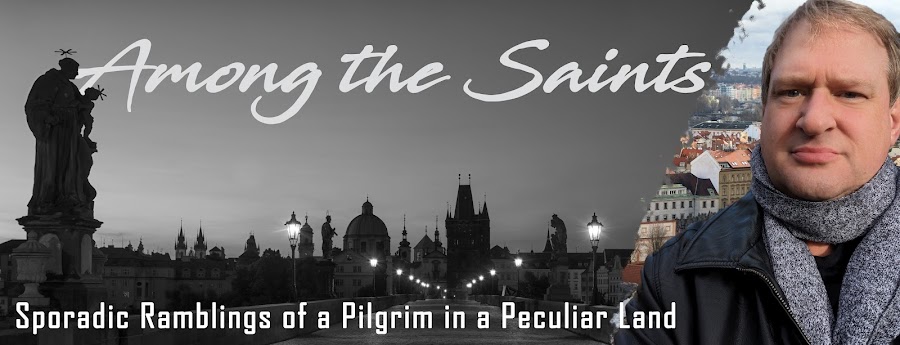I found myself, quite improperly I might add, envying the drivers in those cars, as they zipped by, merrily on their way, to and from work, to and from their families, the grocery store, living out their (supposedly) carefree and happy lives.
I didn't dwell much time on that thought before I felt the sting of a harsh rebuke jog me out of my self-pity. If the demographics are to be trusted, the vast majority of those drivers don't know the Jesus I know. They haven't discovered the awesome power of His forgiveness and mercy, the overwhelming and overpowering grace in which is found the only hope for humanity. Knowing Jesus--if that truly saturated every cell of my body, and every thought of my mind, and every corner of my being--that should make me the most blessed, most joyful, most satisfied person alive.
But if the stories I hear are true--in this part of the world, anyway--a large number of those drivers live under an enormous burden of guilt and anxiety, imposed upon them by a religious culture of self-righteousness that demands endless striving after perfection...or, at least, the appearance of perfection. They may smile and laugh, in a Stepford Wives sort of way, but they go about their lives neither happy nor carefree. Many are doing all they can to stave off the dreary recognition that they have no assurance of hope as their final breath approaches.
If the statistics are accurate, not an insignificant portion of those cars are being driven by people who depend on pharmaceuticals in order to just "hold it together." It's no secret that Utah ranks highest in the nation for use of anti-depressants and the abuse of prescription painkillers, and ranks way up there in deaths by suicide.
Now, I can't deny that these are some hard days for my family and me. And time will tell just how hard those days become. But how is it that the very core of my hope sometimes escapes me? I've had several well-meaning people say to me these days, "Well, we just need to hope for the best." But my first (unspoken) reaction is, what a ridiculous sentiment. What is hoping for the best? Basically it means hoping for what I naturally want. And If my hope rests on those things, sooner or later, I'm going to be disappointed...sometimes mildly, sometimes bitterly. I hope it doesn't rain today. I hope my computer will boot up properly, this time. I hope it's not cancer. My "hope" in such things holds little sway over the reality.
And so if the diagnosis and the prognosis turns out to be not what I want, what is there to hope in? Where is the hope that transcends, supercedes, undergirds, and encircles these hopeless situations?
I know of no other but the promises of Jesus Christ. My hope depends upon the reality of eternal life with Him. My hope depends on the certainty that this life, and all that it can throw at us, is not the end of the story; the credits aren't going to roll just yet. Death does not have the final say. In fact, it's hardly even the beginning of the story.
And these things are either fairy tales we tell ourselves to derive some cold comfort in times like these, or they are reality in which we can rest.
Isaiah 49:23 says, "Then you will know that I am the LORD; those who hope in me will not be disappointed.”
Lamentations, arguably one of the more depressing books in the Bible, carries inside of it this gem in chapter 3:19-24:
I remember my affliction and my wandering,
the bitterness and the gall.
I well remember them,
and my soul is downcast within me.
Yet this I call to mind
and therefore I have hope:
Because of the LORD’s great love we are not consumed,
for his compassions never fail.
They are new every morning;
great is your faithfulness.
I say to myself, “The LORD is my portion;
therefore I will wait for him.”
No doubt there will still be times when waves of panic or sorrow will try and overtake me; but I have assurance that they will not consume me, that they are not the end of the story.
I recall a particular scene in the film The Hiding Place, which is the story of Corrie Ten Boom and her family's imprisonment and death in Nazi concentration camps because they hid Jews during the Nazi occupation of the Netherlands. In this scene, Corrie and her family are captured. She and her sister are to be taken off to one concentration camp, and their elderly father to another. They will not see each other again in this life, and they know it. Corrie's father's parting words to his daughters are, "The best is yet to come."
The best is yet to come.
Actually, the worst was yet to come, as well. Both Corrie's father and sister died horrible deaths in those concentration camps, leaving Corrie alive to tell the tale. And her story was this--beyond that worst, their hope was on the best--and that hope did not end in disappointment.
God grant that this hope, which I recognize and believe, invades me to such a degree that it completely and utterly transforms the thoughts of my mind and the meditations of my heart.

No comments:
Post a Comment
I invite your comments!